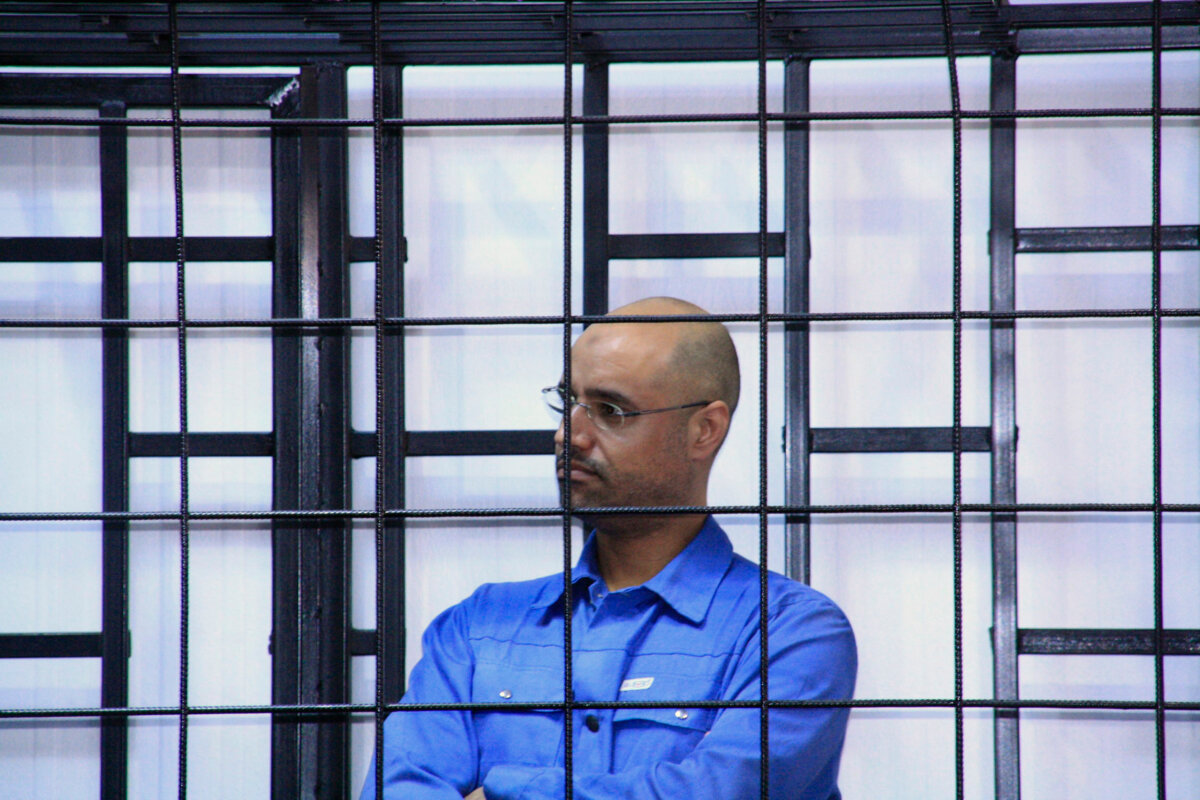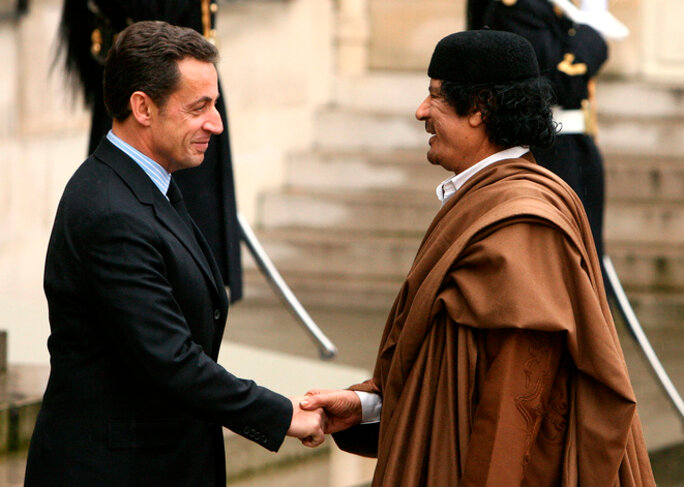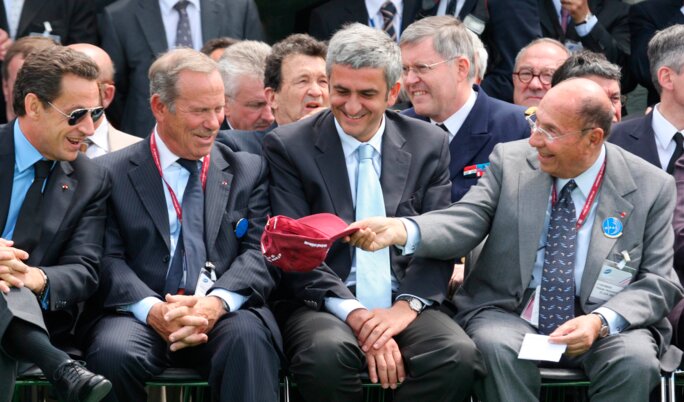France’s former president Nicolas Sarkozy was in March formally placed under investigation by Paris magistrates over evidence that he committed crimes of corruption, illegal election campaign funding, and misappropriation of Libyan state funds in connection with his successful 2007 presidential election campaign.
The ongoing judicial investigation centres on evidence, first revealed by Mediapart, that Sarkozy, who served as president from 2007 to 2012, sought and received millions of euros in illegal funding of his election campaign by the regime of the late Libyan dictator Muammar Gaddafi.
Sarkozy firmly denies the accusation.
The judges leading the case, who have interviewed dozens of witnesses, have also placed members of the former French president’s close entourage under investigation in connection with the organisation of the alleged funding.
In July this year, Muammar Gaddafi’s son Saïf al-Islam Gaddafi, 46, sent a lengthy written statement to the French magistrates in which he details Sarkozy’s “relationships” with the Gaddafi regime, and what he said was its role “in the financing of his election campaign”.
Mediapart has obtained access to the statement, dated July 11th and sent by Saïf al-Islam Gaddafi’s London lawyers to the French investigation on August 10th, and publishes here below translated extracts of the most pertinent accounts concerning the case against Sarkozy.
It is not the first time Saïf al-Islam Gaddafi has accused Sarkozy of receiving funds from his father’s regime. In March 2011, during the civil war in Libya, and after France had recognised the opposition Interim Transitional National Council in Benghazi, he was asked in an interview with Euronews of his opinion of then French president Nicolas Sarkozy. “Sarkozy must first give back the money he took from Libya to finance his electoral campaign,” he said. “We funded it and we have all the details and are ready to reveal everything. The first thing we want this clown to do is to give the money back to the Libyan people. He was given assistance so that he could help them.”
He was captured in November 2011 after the fall of the Gaddafi regime, and was eventually held in detention by a militia in the western Libyan town of Zintan. A death sentence for war crimes pronounced against him in absentia by a Tripoli court, centred on the killing of protestor’s as he and the Gaddafi clan attempted to crush the 2011 rebellion against the regime, was eventually quashed and he was released by the militia in Zintan in 2017. He has subsequently said he plans to launch a comeback to political power in strife-torn Libya, still reeling in chaos seven years after the toppling of Muammar Gaddafi.

Enlargement : Illustration 1

In his statement sent this summer to the French investigation into the suspected Libyan funding of Sarkozy’s election campaign, Saïf al-Islam Gaddafi notes: “I was the first to evoke before the media the funding of Sarkozy’s campaign, following the incidents of February [2011]. I did not ask anyone’s permission on the subject, because Sarkozy had demonstrated that he was not a sincere ally and had played a key role in the aggravation of the conflict in Libya.”
The five extracts below from the statement begin with his account of Nicolas Sarkozy’s early contacts with the Gaddafi regime, in 2005. At the time, Sarkozy was interior minister, preparing to launch his bid for the presidency in elections due in 2007.
-------------------------
1. In his lengthy statement to the French magistrates, Saïf al-Islam Gaddafi described the key role played by Paris-based businessman and weapons sales intermediary Ziad Takieddine (see his confession over his involvement in the illegal funding scam here) in Nicolas Sarkozy’s dealings with the Gaddafi regime, and corroborated mounting evidence that Sarkozy’s chief of staff Claude Guéant received cash sums from the then Tripoli regime. Saïf al-Islam Gaddafi also affirmed that assurances were given by Sarkozy’s entourage that Abdullah Senussi, the intelligence chief and brother-in-law of the late dictator Muammar Gaddafi who was sentenced in absentia by a Paris court in 1999 for his role in the bombing ten years earlier of a French airliner, would be given a pardon, and the role played in the project by Sarkozy’s personal lawyer and friend Thierry Herzog. The September 1989 in-flight bombing over Niger of the Brazzaville-Paris UTA flight 772 killed all 170 passengers and crew, including 54 French nationals (see more on the attempt to dismis the case against Senussi here).
“A character named Ziad Takieddine made his appearance. Mohamed Abdulla Senussi had got to know him and presented him to his father, Abdulla Senussi. Ziad Takieddine presented himself as a friend of Sarkozy, and proposed the organisation of a visit by the latter to Tripoli. Senussi took charge of organising the visit and the meeting.
Ziad Takieddine is the one who talked to Abdulla Senussi, who in turn personally spoke with the Guide [editor’s note: Muammar Gaddafi]. Senussi talked with Gaddafi about Sarkozy’s candidature and was given the promise the issue would be studied. Then afterwards, Takieddine coordinated with Abdulla Senussi and Mohamed over the organisation of the visit by interior minister Nicolas Sarkozy and advised us of his coming. Sarkozy met with the Guide [on October 6th 2005] and the two discussed his request for support with regard to engaging as a candidate in the [French] presidential election campaign.
Sarkozy had [then French prime minister] Dominique de Villepin, also a candidate, as his rival. The chances of success for the latter were slim, which had been confirmed by specially commissioned reports about this. That had encouraged the Libyan state to interest itself in the question of supporting Sarkozy, which he [Sarkozy] did indeed receive in the form of two and a half million euros. Mr Sarkozy sent a representative, Mr Claude Guéant,in order to receive the money, and I learnt from Bashir Saleh [Muammar Gaddafi’s cabinet chief and president of the Libyan African Portfolio, a sovereign wealth investment fund, see more here], that he [Guéant] received the money in cash in his [Saleh’s] office. Bashir Saleh informed me of this, recounting to me an anecdote that because the suitcase could not easily hold the [cash] sums, Claude Guéant was said to have climbed on top of it, pushing with his feet to close it. Claude Guéant was said to have then left for France with this amount.
Takieddine was aware of all these details, of which he ensured the supervision and the coordination. A little while later, Abdullah Senussi informed me that Ziad Takieddine told him that Sarkozy would be ready to intervene in the efforts to prove his innocence in the UTA [French airliner bombing] affair, because of the weak case against him. Sarkozy reportedly indicated that he would call on the services of a lawyer called Thierry Herzog to take charge of this mission.
Senussi sought my involvement, given that Sarkozy had asked for an increase [in funding] at a level of two million euros. I discussed this subject in turn with Baghdadi [al-Baghdadi al-Mahmoudi, Secretary of the Libyan General Peoples’ Committee, a post equivalent to prime minister] given that Libya was targeted behind the accusation against Senussi [who had in fact been found guilty of his role in the UTA airliner bombing and handed a life sentence]. Baghdadi informed me that the subject would be studied that concertation would be had with the higher echelon in order to release the sums and support Sarkozy’s election, using funds allocated to political affairs and the lawyers’ fees in well-known international affairs. And the support for Sarkozy was indeed raised to the level of the sums requested. I am however not aware of the manner in which that was done or the conditions of the payment.

Enlargement : Illustration 2

Sarkozy won the presidential election and he stayed during his first visit to Libya at the Al-Mahary hotel. Here is an event that marked this visit: Senussi was due to meet Sarkozy at his hotel, but the French [officials accompanying Sarkozy] asked for the cancellation of the meeting and the visit to the hotel for fear of journalists and so as not to embarrass president Sarkozy given that Senussi was implicated in the UTA plane affair. The two men settled with a phone call, during which Sarkozy thanked Senussi for the support given to him by Libya. They raised the closure of the case regarding Senussi, and Sarkozy confirmed the imminence of that closure and an ending to the case with those responsible not identified.
The phone call was recorded and I personally listened to it afterwards. There exist two copies of the recording, one in the archives of Libyan intelligence, the second somewhere with Senussi.”
- MEDIAPART'S ANALYSIS: The case against Senussi, and his life sentence, would not in fact be overturned, nor the international arrest warrant issued by France. However, until at least 2009, Nicolas Sarkozy’s close team were engaged in evaluating the chances of re-opening the case in order to annul the international arrest warrant against Abdullah Senussi. Lawyer Thierry Herzog, a close acquaintance of Sarkozy’s, received a written mandate from Senussi to represent his interests, following a visit by Herzog to Tripoli in November 2005. As previously reported by Mediapart, French lawyer Francis Szpiner, who acts as legal counsel for SOS Attentats, a French association representing victims of terrorist attacks and which was a civil party to the UTA DC10 bombing case, accompanied Herzog during the latter’s meetings with Libyan jurists acting for Senussi.
2. Saïf al-Islam Gaddafi stated that Alexandre Djouhri, a business intermediary close to Dominique de Villepin (French prime minister from 2005-2007), was involved in negotiations for the sale of Airbus passenger aircraft to Libya, and also alluded to political funding of Villepin by Tripoli.
“One the cases concerning the Lockerbie and UTA affairs were closed [in 2004], Libya concluded several strategic contracts, notably a contract for the purchase of Airbus planes. The Libyan authorities in charge of that contract had been contacted on several occasions by commercial agents, commercial intermediaries, and politicians, like [TAG group boss] Mansour Ojjeh, the French businessman of Saudi origin […] The object of Mr Ojjeh’s contacts with the Libyans was in relation to the Airbus planes and arms contracts with France. He proposed that the contracts be established in the name of a company called Sofresa in order to avoid the legal and administrative obstaclkes that could impede the conclusion of a contract for the benefit of Libya […] We alas discovered that this company existed for the purpose of settling contracts between Saudi Arabia and France and to serve as a means of paying commissions and bribes to the decision-makers in these contracts.

Enlargement : Illustration 3

During the different rounds of negotiations, the Libyan side made acquaintance with […] a certain Alexandre Djouhri, through the intervention of Mr Ojjeh. The latter enjoyed good relations with circles close to [then French president] Jacques Chirac, and he said he was ready to help us with all the procedures concerning the Areva company’s nuclear reactor, and to supply all other facilities requested by the Libyan government.
The contacts with Alexandre Djouhri multiplied, and I presented to him Bashir Saleh, he being in charge of the dossier of relations with France. It was the beginning of the French elections and Sarkozy had the post of Minister of the Interior. Alexandre Djouhri and the circle of those close to [outgoing] president Jacques Chirac supported the candidate Dominique de Villepin against Sarkozy. I followed these affairs in the anticipation of the outcome of Libyan-French relations in the light of the change produced by the result of the French presidential elections.
Through these contacts and concertation, we were made the proposition of supporting the electoral campaign of Dominique de Villepin. Among the demands of this team was the payment of the balance remaining on contractual sums agreed by Libya for the renting of a French-made Falcon plane, owned by Alexandre Djouhri. This issue was indeed the object of discussion with the team and the debts, as well as the interest on payments overdue, was settled. This was the case even though the Minister of Finance expressed his reserves over the payment of interest, which Alexandre Djouhri had maintained. According to what he said, he envisaged using the sum of the interest payments to hand bribes to people close to president Jacques Chirac in the framework of [encouraging] support for cooperation with Libya. It was to be the beginning of the coordination with circles close to Chirac and the candidate Dominique de Villepin [who in May 2006 decided not to run in the election].”
- MEDIAPART'S ANALYSIS: The above extract from Saïf al-Islam Gaddafi's statement corroborates evidence in the ongoing French judicial investigation concerning the circumstances of the sale of Airbus aircraft to Libya. Several witnesses have detailed the involvement of Mansour Ojjeh alongside Alexandre Djouhri in the negotiations that took place at EADS, the European aerospace consortium and Airbus manufacturer, in presence of its then international development director, Jean-Paul Gut. The investigation has also found trace in Djouhri’s banking accounts of a payment made to Mansour Ojjeh and another, totalling 500,000 euros, to Dominique de Villepin in 2009.
3. Saïf al-Islam Gaddafi spoke also of Nicolas Sarkozy’s efforts to sell French nuclear reactors and Dassault Aviation’s Rafale fighter aircraft to Libya. He said that when Libya stuck by its decision not to place an order for the Rafale, Sarkozy, who showed “strange persistence” in securing a deal, was “visibly irritated”.
“Among the pledges made by Sarkozy was to facilitate the obtaining by Libya of a civil-use nuclear reactor built by the Areva company.
At each [opportune] time, Sarkozy proposed with strange insistence that Libya buy the French Rafale plane. We afterwards learnt that the owner of the Dassault company was the head of a powerful media [group] which was one of Sarkozy’s supporters. This contract was very important for Sarkozy, who had made promises to the Dassault company of personally selling the Rafale on the markets, all the more so after the failure [to sell the Rafale] in India and Morocco – where the contracts involving the Rafale were cancelled in favour of American F16s. According to what he said, Sarkozy also would have need of Dassault’s financial and media support during the next elections.

Enlargement : Illustration 4

At the same time, Libya wanted to acquire Eurocopter Tiger [military helicopters] from France but Germany, which took part in their construction, was opposed to this. Thanks to his powers, Sarkozy managed to get around the German veto by ordering the sale to Libya of Eurocopter Tiger machines used by the French air force. It was an opportunity for Sarkozy to confirm to us his commitment to honour what had been agreed on cooperation matter with the Libyan authorities, in return for the support given [to Sarkozy] during the elections.
What preceded is part of an agreement between Libya and Sarkozy. I remember having personally mentioned these contracts in the French media and to have spoken of the lifting of the embargo on arms and equipment for Libya […] At the time, Sarkozy was on a visit to the United States after having won the elections. He was in all likelihood bothered by my statements, given that he had asked me to temper and moderate my declarations which, according to what he said, irritated certain among his opponents and rivals.
Sarkozy undertook to deliver on all the accords and agreements made with the Libyan party, like all the promises made before us, notably those regarding the obtaining by Libya of technology and equipment, the accent being placed among other things on the nuclear reactor, security equipment, spying equipment and cooperation in intelligence issues. He passed on to us the dossier of a French internet surveillance company called Amesys. Sarkozy had presented it through the involvement of Claude Guéant in his position as a staff member of the French Ministry of the Interior [when Sarkozy was still interior minister just before his election].
Sarkozy then came back again to re-start the purchase of the Rafale planes. I personally obtained information from the Emiratis concerning the extent of technical complexities of this aircraft and its high cost, information which I passed on to the [military] command. On top of that was the technical and legal opinion of the defence secretariat about the existence of considerable risks in this contract, because it did not allow for details and guarantees concerning the supply to Libya of a sufficient number of munitions that were compatible with these aircraft. Which in itself constituted a good reason for not taking the contract into consideration.
The French side then sent a delegation to meet me at Jufra [district in central Libya] and Éric Trappier, the current CEO of the company Dassault Aviation, was part of it. The aim was to exert pressure on the Libyan side to conclude the Rafale contract. I informed them of the opinion of the competent Libyan authorities, an opinion they already knew of, and which had been notified to them through the canals and contact points intended for that purpose.
Sarkozy also sent the French interior minister, accompanied by a large delegation and representatives of the French Ministry of Defence, to reach a conclusion to the contract for the Rafale, again illustrating the curious persistence of Sarkozy to satisfy the Dassault group, owner of the company and a media institution, with disregard to the interests of the Libyan side which maintained its decision to cancel the contract.
This visibly irritated Sarkozy, so much so that during the war in 2011, Sarkozy met with Bashir Saleh and told him that Gaddafi had played him for a fool and did not purchase the Rafale – a sign that the subject was close to Sarozy’s heart at a personal level and came before the line that he gave to public opinion about the instauration of democracy in Libya.”
- MEDIAPART'S ANALYSIS: On May 25th this year, Anne Lauvergeon, former CEO of French nuclear energy equipment and technology provider Areva, gave a statement to the ongoing judicial investigation in France detailing Nicolas Sarkozy’s energetic attempts to establish a nuclear deal with Libya. As of July 2007, immediately after his election as president, an agreement for “cooperation in the domain of pacific applications of nuclear power” was signed with what she described as an “atypical rapidity” and without Areva’s direct involvement. The project collapsed in face of Lauvergeon’s opposition to it, founded, she said, on her estimation that the Gaddafi regime “was not sufficiently rational to be able to manage civil nuclear power in a manner that was sure”. Meanwhile, Claude Guéant and Ziad Takieddine succeeded in supplying Libya with the electronic weaponry manufactured by French company Amesys. This included the sale to the regime of software, called Eagle, to spy over the entire Libyan internet system, and which was used by the Gaddafi regime to counter opposition to it during the 2011 ‘Arab Spring’ revolts.
4. In his statement, Saïf al-Islam Gaddafi detailed how Ziad Takieddine had been ousted as intermediary in the French-Libyan dealings in favour of Alexandre Djouhri, and how the latter established relations with Bashir Saleh “without the knowledge of the Libyan leadership”. He also referred to the threats made against Saleh in order to ensure his silence about the funding of Nicolas Sarkozy’s election campaign, and claimed that Sarkozy had requested further funding for his 2012 re-election bid.
“We noticed the withdrawal from the scene of Ziad Takieddine for reasons unclear, and we saw the emergence of Alexandre Djouhri.
After the war [was launched] against Libya [the March-October French- and British-led NATO airstrikes against the Gaddafi regime which led to its fall] we acquired the certitude that Ziad Takieddine had been excluded from the circle of close to president Sarkozy, and that Alexandre Djouhri was in direct contact with Bashir Saleh and had become Sarkozy’s friend after demonstrating hostility towards him. Relations were knotted between Bashir Saleh and Alexandre Djouhri […] working relations which, at the time, the higher echelon of the Libyan leadership was not aware of. This included the acquisition of property in Switzerland, an acquisition revealed recently.

Also during the war against Libya, Alexandre Djouhri threatened Bashir Saleh with death if he mentioned the support given to Sarkozy’s campaign. It should also be noted within this context that after the date of August 20th 2011, Bashir Saleh was arrested in the capital Tripoli by the Zintan militia led by Ibrahim al-Madani. The latter [reportedly] said he had come under French pressure to free Bashir Saleh and to send him to France. An in face of the media outcry over his presence in France he was sent to South Africa. The death threats Alexandre Djouhri addressed to Bashir Saleh, if the latter raised the subject of the funding of Sarkozy, have not stopped. This was confirmed on many occasions by Bashir who feared being assassinated because of this business.
Mabrouka al-Sharif, deputy director of ‘protocol’ for Muammar Gaddafi, served as the intermediary between the Guide and Sarkozy [and she] transferred, in 2010, a note from Sarkozy indicating that Mabrouka was tasked with transmitting a verbal message to the Libyan leadership. Mabrouka revealed the contents of the message, namely that Sarkozy hoped to obtain financial support from Libya to engage in the presidential elections to come in 2012. Copies of this message were kept in the Libyan and French archives.”
- MEDIAPART'S ANALYSIS: Saïf al-Islam Gaddafi’s comments about Alexandre Djouhri’s threats against Bashir Saleh are aimed at providing the beginnings of an explanation about the shooting attack on Saleh in Johannesburg on February 23rd this year. Saleh, who was seriously wounded by unidentified gunmen, was subsequently moved, by people loyal to him, out of South Africa to settle in a country in the Middle East. In an interview with a current affairs programme broadcast on French public TV channel France 2, he for the first time recognised the existence of secret funds destined for Sarkozy. The alleged request by the latter for funding for his 2012 re-election bid had previously also been mentioned by a witness – a former member of the Gaddafi regime – in a statement given under the guarantee of anonymity to the current French investigation.
5. In July 2007, five Bulgarian nurses and a Palestinian doctor who had been imprisoned in Libya since 1999 on charges of infecting more than 400 child patients in a Benghazi hospital with the HIV virus (see more on this extraordinary affair here) were released after high-profile lobbying by the newly elected French president, Nicolas Sarkozy, who sent a French plane and his then wife Cécilia to take them to France. According to Saïf al-Islam’s statement, it was shortly after that when the Qatari authorities revealed to the Gaddafi regime that they had provided Sarkozy with funds for his 2007 election campaign.
“The Libyan government also investigated the interest of the Qataris in taking charge of compensation [of those infected by the HIV virus in Benghazi], on Sarkozy’s request. It turned out, in their own admission repeated several times to the Libyan leadership, that they took charge of the amount of the indemnity paid to the families of the HIV victims, amounting to 1 million dinars for each of the 438 contaminated children. They also indicated that they had earlier advanced funds in support of Sarkozy during the 2007 presidential elections, won by Sarkozy, in addition to the sums paid in the pre-mentioned case of the Bulgarian nurses. It was in turn for the latter [Sarkozy] to provide France’s green light for Qatar to acquire a major stake in the company EADS.
Information obtained directly from the Qataris indicate that Sarkozy would have also taken up an engagement to work for the agreement of Italy, Germany and Spain, partners of France in the EADS group. Mr Jean-Paul Gut, a director at EADS, later confirmed this information during our meeting together. In the immediate wake of his departure from EADS, he founded a private company and worked with the Qataris. The latter were delighted with the collaboration of Sarkozy, to whom they were said to have given the nickname ‘Sarkozy al-Thani’, in an allusion to the Qatar ruling family.”
- MEDIAPART'S ANALYSIS: Despite several attempts, the Qatari bid to take a stake in EADS was to fail. But they did succeed in taking an important stake in French company Lagardère Active, which itself was a shareholder in EADS. Qatar Holding, a branch of the Qatari sovereign investment fund, the Qatar Investment Authority (QIA), became a shareholder of Lagardère in 2007, and by 2012 its stake in the company had risen to 12.83%, making it the principal shareholder. That rose further to 16.7% in 2017. Meanwhile, the allegation that Qatar provided funding for Nicolas Sarkozy’s campaign in 2007 raises further questions about the welcome the Persian Gulf state has enjoyed in its dealings with France.
-------------------------
This translation into English of Saïf al-Islam Gaddafi's statement is based on a French translation from the original text in Arabic.
See more of Mediapart's extensive investigations into the Libyan funding affair, beginning with these reports (with links to other articles) here, here, and here.
-------------------------
- The French version of this article can be found here.
English version by Graham Tearse
-------------------------------------------------------------------------
If you have information of public interest you would like to pass on to Mediapart for investigation you can contact us at this email address: enquete@mediapart.fr. If you wish to send us documents for our scrutiny via our highly secure platform please go to https://www.frenchleaks.fr/ which is presented in both English and French.
----------------------------------------------------------------------



